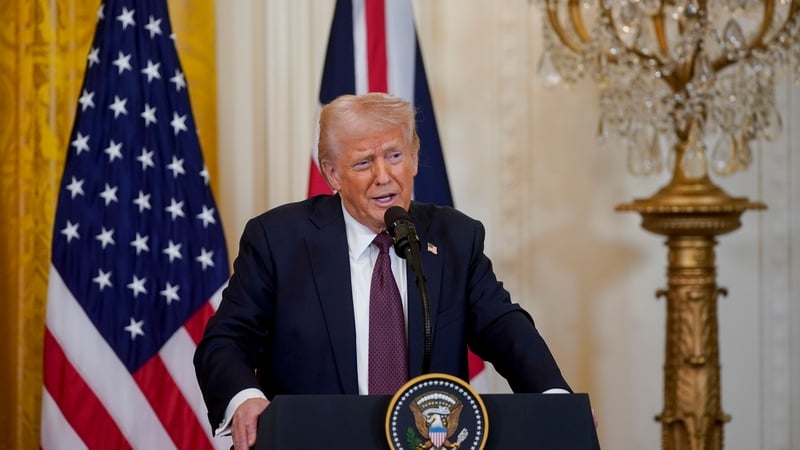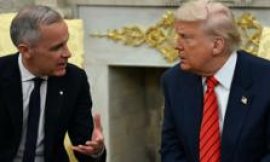US President Donald Trump has said his proposed 25% tariffs on Mexican and Canadian goods will take effect on 4 March along with an extra 10% duty on Chinese imports because deadly drugs are still pouring into the US from those countries.
Mr Trump told reporters in the Oval Office that the fresh tariffs on Chinese imports would stack on top of the 10% tariff that he levied on 4 February over the fentanyl opioid crisis, resulting in a cumulative 20% tariff.
Mr Trump first announced the new duties on Chinese imports in a post on his Truth Social site that he would impose the additional 10% tariff, effective 4 March.
In the post, Mr Trump said drugs, namely fentanyl, were still coming into the US at “very high and unacceptable levels,” with a large percentage of them the deadly opioid fentanyl.
He told reporters he decided to add the extra tariffs on China and stick to the Tuesday deadline for Canada and Mexico given what his administration sees as insufficient progress on curbing fentanyl flows into the country.
Asked if Mexico and Canada had made enough progress on curbing fentanyl shipments into the US, Mr Trump said “I don’t see that at all. No, not on drugs.”
“There are ongoing discussions with the Chinese, Mexico and Canada,” a White House official told Reuters. “We’ve gotten a good handle on the migration issue, but there are still concerns on the other issue of fentanyl deaths,” they added.
Sources said that Mexico will extradite to the United States drug lord Rafael Caro Quintero, who was convicted in 1985 of murdering a US Drug Enforcement Administration agent but released in 2013 and returned to trafficking.
According to the Centers for Disease Control, 72,776 people died from synthetic opioids in 2023 in the US, chiefly from fentanyl.
Foreign aid freeze
Customs and Border Patrol agents seized 991 pounds of fentanyl at the southwest border in January 2025, down 50.5% from a year earlier, but still enough to kill many millions of Americans, the White House official said.
Read more: Donald Trump’s 25% tariff threat a negative for Ireland
Mr Trump’s move to blame Mexico and Canada for the continuing flow of fentanyl into the US comes as his freeze on US foreign aid is disrupting efforts to fight the illicit trade.
Reuters reported on Monday that his aid freeze has stalled the planned expansion of a United Nations programme to help the Mexican Navy better screen cargo and interdict fentanyl ingredients and other contraband, and other activities.
Also hampering US drug interdiction efforts is a decision by US Customs and Border Protection to delay implementation of a ban on duty-free low-value package shipments from Canada, China and Mexico until better screening can be implemented.
Tariff tactics
Mr Trump’s decision to ratchet up tariffs on Chinese goods mirrors his moves to escalate tariffs during his first-term trade wars with China until serious trade negotiations took place between the world’s two largest economies.
Dean Cheng, senior adviser at the US Institute of Peace, said the rising tariffs were part of a broad push by Mr Trump to respond to Chinese challenges that also included the State Department’s removal of wording about not supporting Taiwan independence to tougher scrutiny of US-listed Chinese companies.
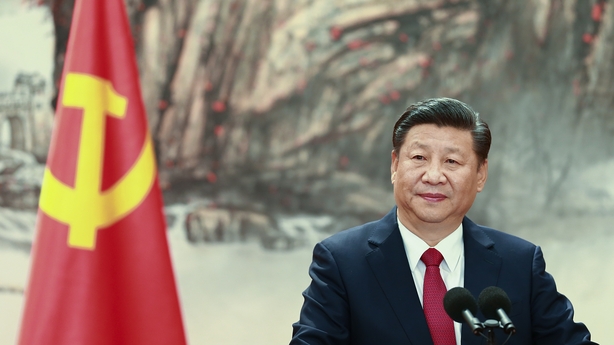
“It’s all the pieces on the chessboard,” he said.
China has promised to take “all necessary countermeasures” to the imposition of further tariffs.
“If the US side insists on going its own way, the Chinese side will take all necessary countermeasures to defend its legitimate rights and interests,” China’s commerce ministry said.
Piling on more tariffs could pose risks to both the Chinese and US economies. China has been struggling with a property crisis and weak domestic demand, while US inflation remains sticky and interest rates are elevated.
China, in a letter to US Trade Representative Jamieson Greer, called for equal dialogue and consultation.
Mr Trump has targeted early April for implementing broader “reciprocal tariffs” to match the import duty rates of other countries and offset their other restrictions.
During a news conference, Mr Trump downplayed the potential inflationary impact of tariffs for Americans, arguing that his first-term tariffs on China raised hundreds of billions of dollars without negatively affecting the US economy.
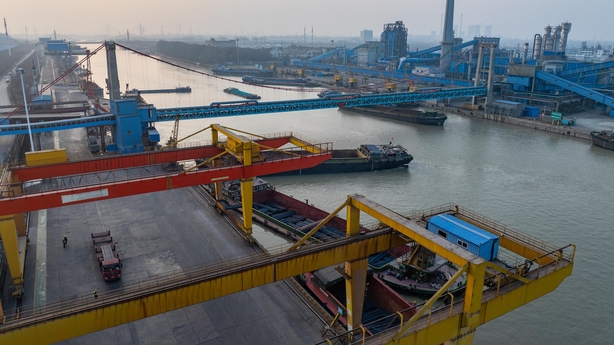
“I find that it’s not about inflation. It’s about fairness. And the inflation for us has not existed, and I don’t think it’s going to exist,” he said.
Tariff, border talks
Canadian and Mexican officials were due to meet with Trump administration counterparts in Washington to try to forestall the tariffs, which could deal a serious blow to a highly integrated North American economy.
Mexican Economy Minister Marcelo Ebrard will meet with Mr Greer later today and Commerce Secretary Howard Lutnick tomorrow.
Mr Ebrard’s deputy, Vidal Llerenas, said Mexico could adopt other trade measures beyond the recent tariffs it imposed on certain imports to reduce cheap shipments from China.
In Canada, Public Safety Minister David McGuinty said that the progress Canada has made on tightening security along the border with the United States and combating drug smuggling should satisfy the Trump administration.
Latest US stories
“The evidence is irrefutable – progress is being made,” Mr McGuinty said in televised remarks to reporters in Washington ahead of two days of talks with US officials.
“In my view, any test that was put on Canada in terms of showing progress and meeting standards for the border – I believe those have been met,” he added.
The Canada Border Services Agency said in a statement that it was launching a targeted, cross-country initiative to intercept illegal contraband arriving and leaving the country, with a focus on fentanyl and other synthetic narcotics.
Trump says US, Britain working on ‘great’ trade deal
Mr Trump held out the prospect of a “great” post-Brexit trade deal that could avoid tariffs on Britain yesterday – as he hailed Prime Minister Keir Starmer as a tough negotiator.
“We’re going to have a great trade agreement, one way or the other,” Mr Trump told reporters during a joint press conference with Mr Starmer at the White House, adding that a new deal could come together “rather quickly.”
Pro-Brexit politicians dangled the promise of a US-UK trade deal as one of the benefits of leaving the European Union ahead of the 2016 referendum on EU membership.
But they failed to agree a deal following the vote.
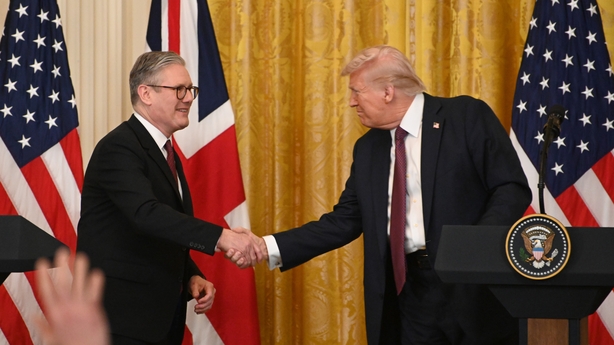
President Trump, who authored a book called the ‘Art of the Deal’, hailed former human rights lawyer Mr Starmer’s negotiating skills during the press conference.
“You’re a very tough negotiator – I’m not sure I like that, but that’s ok,” Mr Trump joked.
Asked if Mr Starmer had managed to persuade him to drop the threat of tariffs, the US president chuckled and said “He tried. He was working hard, I’ll tell you that.”
“He earned whatever the hell they pay him over there,” he added.
Mr Trump’s comments on a deal signal that his administration is keen to revive the trade talks with Britain, which made little progress during his predecessor Joe Biden’s term in office.
Mr Starmer said he had had a “productive discussion” with President Trump, adding that the United States and Britain were now working on a new “economic deal.”
“We could very well end up with a real trade deal where the tariffs wouldn’t be necessary,” Mr Trump told reporters, adding that the eventual deal could be “really terrific for both countries.”
Yesterday, Mr Starmer defended Britain’s trade balance with the United States, calling it “fair, balanced and reciprocal.”

